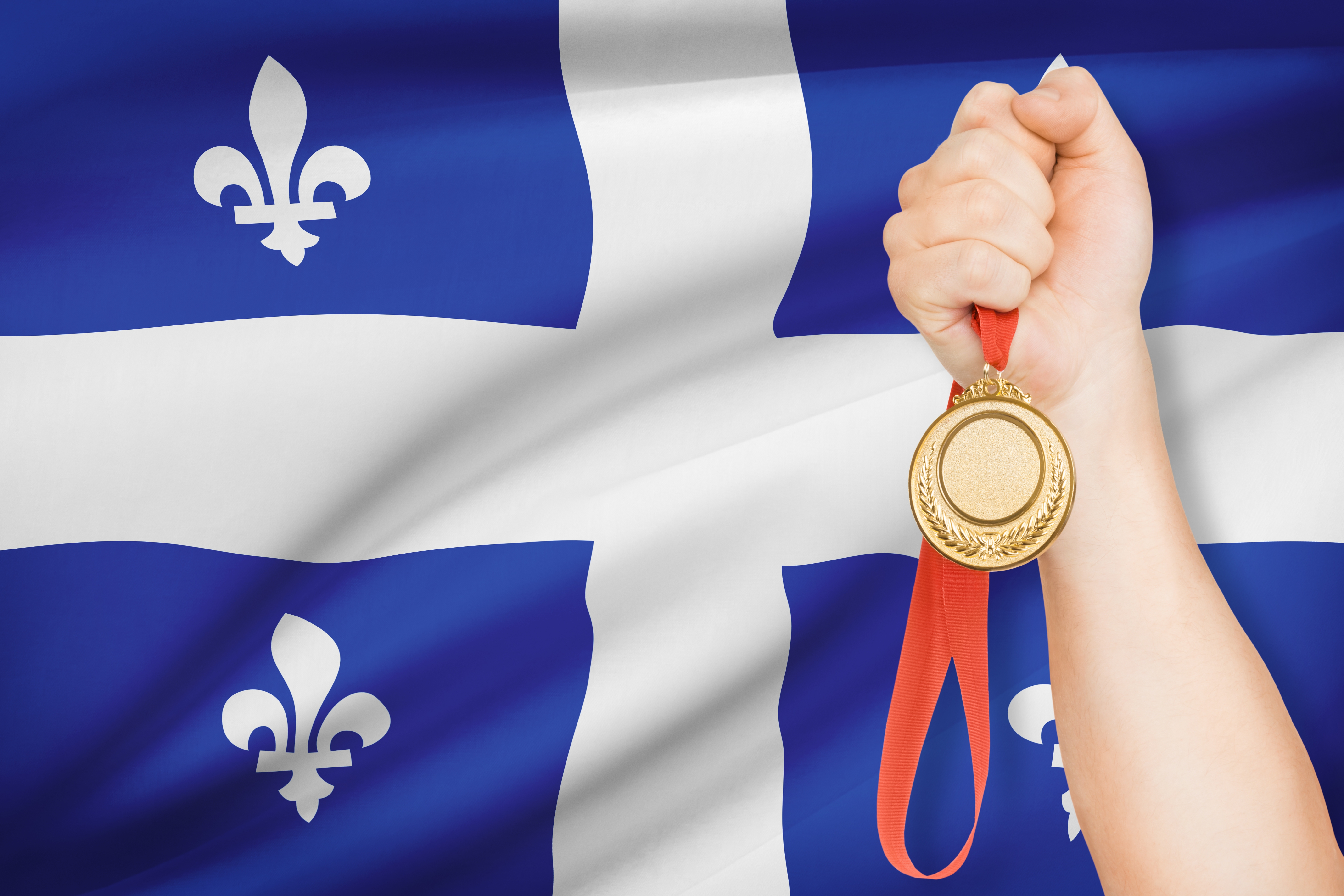on parle

Autumn Colours and Language: Embracing Québec’s Vibrant Season
October 2024
Autumn Colours and Language: Embracing Québec’s Vibrant Season
Autumn is gently settling in, breathing colour and inspiration into our everyday lives.
At the Shop, we believe that the key to success in reaching Québec audiences lies in a locally grounded approach and an authentic advertising strategy.
Grab yourself a cup of your favourite autumn-spiced beverage, make yourself cozy and immerse yourself in Québec's rich culture, unique values and vibrant language. When it comes to advertising, communications and culture, here’s what you should know (in our humble opinion).

National or Provincial Olympic Pride? Celebrating Québec’s Uniqueness
Were you glued to the coverage of our Canadian athletes at the Paris 2024 Olympic Games this summer like I was, celebrating our national excellence and riding the intense waves of emotion through our athletes’ achievements as though their victories were our own? Do you consider yourself Canadian or Québécois(e)? Though seemingly simple, this question shapes how we experience Olympic pride. Of course, whether you are Canadian or Québécois, you'll cheer on our athletes with admiration, but let’s face it: Quebecers add a touch of maple syrup to their celebrations! I’m Québécoise, and like many of us, I have come to hold a special place in my heart for francophone athletes who strengthen our pride and celebrate the cultural nuances of our province.
What makes this phenomenon of cultural appreciation even more interesting is to understand the driving force behind it. Quebecers strongly identify with the French language, a pillar of Québec culture. This attachment to francophone athletes reinforces the sense of belonging to a francophone identity, especially in the light of Canada’s anglophone majority. Quebecois athletes such as Maude Charron, Alexandra Leduc, Joannie Rochette or Alex Harvey, embody this cultural identity and are often seen as ambassadors on the international stage. Their success is celebrated as a victory for the francophone community, providing precious visibility for Québec culture. However, this attachment goes beyond a shared language.
For many Quebecers, supporting homegrown athletes is a way of affirming their cultural identity. The success of a francophone athlete resonates deeply with us, creating a sense of community that transcends geographic boundaries. This emotional connection strengthens the bond between Quebecers and their athletes, affirming a collective pride rooted in shared cultural values. During the Olympic Games, this attachment even manifests in how the media communicate. To reach a Québec audience, it is imperative to take cultural nuances into account. Messages that emphasize personal stories and roots tend to resonate more deeply with Quebecers. So, even if an athlete is representing Canada, Québec media often promote a narrative that highlights their Québec roots, fostering a sense of belonging and creating a lasting impression.
In short, celebrating success in sports during the Olympic Games is part of a much broader context in which Québec pride and Canadian identity are intertwined, making each victory even more meaningful for those who experience it. By featuring Québec athletes in their communications, brands embed themselves in local culture and cultivate a lasting emotional connection. These collaborations create strong bonds with consumers, reinforce their sense of belonging and potentially increase the reach of advertising campaigns. So why not do as most Quebecers do during the Olympics, and add a touch of maple syrup to your communications (as we do with our celebrations)? Choose to champion local athletes by celebrating their inspiring journeys and highlight our culture’s authenticity with narratives that resonate with Quebecers.
Catherine Léger, Account Manager

Do You Speak Preteen?
I've noticed something lately. My 10-year-old son no longer uses the very famous Québec expression “t'as pas rap dans le déc” (literally “you don’t fit the décor,” i.e., “you have no clue,” “you make no sense”), a phrase I’d use on anyone with ears when I was his age. No, now when I say something is not relevant “in the decor,” he replies “wesh!” But then, he also uses “wesh” when he's surprised, when he’s bored, when he meets his friends in the street, or when I serve him salmon for dinner (let's face it folks: “wesh” basically just means “yo”).
As any parent of 10-ish-year-olds will attest, “wesh,” “yalla,1” “pats,2” “giou3” and “chè4” spice their speech. Borrowed sometimes from Creole or Arabic, and often French from France (for example, my son says “j'ai la flemme,5 maman”—literally “I have laziness”, i.e., “I can’t be bothered”—when I ask him to tidy his room), these expressions have become an integral part of their vocabulary, whether we like it or not.
Far be it from me to ramble, but as you now know, the French spoken in Québec is unique, enriched by history, migration and cultural influences. Québécois stands apart with its rich vocabulary and delightful expressions that liven up any dinner party with newcomers to the province. The media, television and rap songs (but especially those showy YouTubers, if you ask me) introduce new linguistic nuances, especially in Québec’s larger cities where diversity is more pronounced.
Our language has always been colourful, but it's even more so now, thanks to our friends from all over the world who are painting it brighter by settling here and pushing us to invent a new joual.
Like it or not, this everyday language demands consideration. Take an interest in it and understand it, so you can better integrate it into your communication strategies tailored to the Québec market. Imagine talking to all those parents in a language they hear every day, in their own homes! That's exactly what we do at the Shop: We ensure that you add every nuance of our distinctive Québécois to your palette.
Valérie Forget, Adaptation Director
1 From Arabic, meaning “come on,” “let's go”
2 From Creole, diminutive of “patnais,” meaning “friends”
3 From Creole, a variant of “gou,” meaning “good”
4 From Arabic, meaning “well done to you”
5 From preteen, meaning, “I’m 10 but I still need my mommy”

Women First: An Evolving Québec Identity
As with any ever-evolving society, Québec is constantly changing, and with it, its residents’ perceptions and identities. What held true yesterday may well be reinvented today. This transformation is echoed in the way Quebecers, particularly women, define themselves.
A recent pan-Canadian study by the firm Léger highlights this social transformation, revealing a major shift in the way Québec women perceive themselves; while they previously defined themselves primarily by their roles as “wife” or “mother,” they now identify themselves first and foremost as women in their own right, relegating the roles of mother and spouse down to second and third place.
This finding is especially interesting when compared to the rest of Canada, where the order is reversed. Women in anglophone Canada identify themselves first as mothers, secondly as wives and only thirdly as women.
This shift in the way women in Québec view themselves is not trivial—it is the result of decades of social and political struggle, championed by a bold Québec feminist movement. Access to low-cost childcare, for example, was a major victory in the 1990s that allowed thousands of women to enter and remain in the workforce while raising their children and establish the value of work-life balance. Similarly, the right to contraception and abortion, legalized in Canada in 1969 and later reinforced in Québec in the 1980s through measures that facilitated greater access, gave Québec women unprecedented control over their reproductive choices.
These and other initiatives have shaped a strong and distinctive female identity, where autonomy and equal opportunity have become key issues. The Québec feminist movement not only asserted women’s fundamental rights, but also brought about a lasting transformation in Québec society.
By recognizing the evolving outlook of women in Québec, brands have the opportunity to rethink their approach and to better respond to an audience that increasingly values autonomy and individuality. To truly connect with this demographic, it is no longer sufficient to address women as mothers or wives. Rather, we must recognize them in all their complexity, as independent and ambitious women in search of authenticity.
It's time to drop the image of a housewife who buys groceries for the whole family and puts her heart and soul into preparing evening meals. The modern Québécoise values empowering personal choices, such as selecting quality products for herself, from eco-friendly cosmetics to organic foods for conscious and healthy eating. Brands must now cater to these women as informed consumers who are concerned about their well-being and the credibility of the products they consume.
Only by responding to the real aspirations of women in Québec can companies build lasting, meaningful relationships based on respect, recognition and a deep understanding.
Audrey Boissonneault, Strategic Planner

Hitting the High Notes with PC
Every new client that comes to TFS is a source of joy, but especially of hope for us adaptation enthusiasts. “Nothing beats a client that is committed to speaking to Quebecers in their language!” It’s always a treat for us! So, when the president himself came to visit, we obviously rolled out the red carpet for him (which we always do, by the way).
President's Choice (PC) is an important brand in the Québec marketplace, one that is best known for its famous advertising campaigns featuring the president in question, Galen Weston, demonstrating his bilingualism to La Belle Province.
But the new PC campaign, brilliantly spearheaded by our friends at Zulu Alpha Kilo, no longer features Mr. Weston. Nope, now it's all about life—life and its little mishaps, proving that PC is always on hand to help simplify our day-to-day. We did what we do best, of course: adaptation. We adapted the message, tagline, supers, voiceover, radio and TV ads, brochures, web pages, legal texts, digital ads, billboards and POS displays... until we had to adapt a song. Wait, what? A song?! Can you adapt a song the same way you adapt a tagline? Well, no. There's quite an art to adapting lyrics, and even if TFS has proven its expertise in adapting advertising content for the Québec market time and again, songs are a whole different ballgame. There are rhythms to respect, meters to consider, demos to sing, and singers to choose and direct.
Despite our expertise, there are times when we need a little professional assistance to deliver the best possible adaptation for a project. As luck would have it, we knew just the person for the job—someone who did an impeccable job with us on Nestea campaigns as well as Tim Hortons musical and Camp Day campaigns, among other collaborations: Étienne Gaudreau, a musician who specializes in adapting songs for brands. As he points out, “The challenge in adapting songs in advertising is to find out how to make them sound as authentic as the original work (to the extent possible), respecting the musical metre (the rhythmic arrangement of a song) and the overall messaging, while still finding a twist—a unique angle and colour specific to the language to which we’re adapting the content.” You're probably wondering which song we adapted. We'll let you watch and tell us if you recognize it.
In the meantime, don't hesitate to call on TFS for absolutely ALL of your adaptation needs, even those that will have us bursting into song!
Valérie Forget, Adaptation Director
